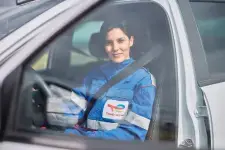Night driving presents a challenge for every driver. In addition to the fact that any nighttime activity, except sleeping, contradicts our circadian rhythm, additional obstacles include factors like reduced visibility conditions and quick fatigue. Moreover, adverse weather conditions and biological factors, such as poorer eyesight, demand extra concentration and adaptability. Therefore, we’ve prepared useful tips, some of which you might already be familiar with, but they’ll help you prepare for nighttime driving.
Adjust your side mirrors
Properly adjusted side mirrors reduce blind spots and glare caused by headlights from vehicles behind you. Lean your head against the window and adjust the left mirror so you can see the left rear corner of your car. The same rule applies to the right mirror.
Avoid staring at oncoming headlights
The glare from headlights, as well as bright signs and other light sources, temporarily blinds drivers during night driving. It’s advisable not to look directly at them.
Use high beam headlights whenever permitted and safe
High beam headlights are allowed only when there are no other vehicles ahead of you. If a driver coming toward you forgets to turn off their high beams, signal them. If the same driver is behind you, use your hazard lights.
Rest if you are tired
Fatigue weakens reflexes and reduces perceptual abilities. If you feel drowsy during the drive, it’s best to find the nearest available facility, such as a hotel, motel, restaurant, or gas station, to take a break and rest.

Be visible when stopped
If you need to stop for any reason, whether due to a malfunction or simply to take a break, park your vehicle in the emergency lane and use proper signaling (such as placing a reflective triangle behind your vehicle) so that other drivers can notice you in the dark.
Check your eyesight
Regular eye check-ups with an ophthalmologist will help you identify any need for corrective aids like glasses or contact lenses. Regardless of using such aids, individuals with significantly impaired vision should avoid driving at night.

TotalEnergies Service Network

Contact us

Don’t forget this in case of a traffic accident
